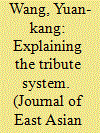| Srl | Item |
| 1 |
ID:
177065


|
|
|
|
|
| Summary/Abstract |
Is unipolarity durable? IR scholars have offered contradictory answers, with primacists arguing for the longevity of US unipolarity and declinists suggesting the opposite. The literature suffers, however, from two shortcomings: (1) theories of unipolarity built on the sole case of the United States are difficult to generalize; and (2) they tend to focus on the defensive measures available to lesser states while downplaying the proactive means the unipole can adopt to prolong its dominance. To remedy these weaknesses, I propose a model of strategic interaction and apply it to two cases of unipolarity in East Asian history, Ming China (1368–1644) and Qing China (1644–1912). I argue that unipolar durability is an outcome of strategic interactions between the unipole’s proactive measures to sustain its asymmetric power advantage and the potential challenger’s ability to increase its power without drawing the unipole’s military containment. Unipolar durability is contingent, not preordained.
|
|
|
|
|
|
|
|
|
|
|
|
|
|
|
|
| 2 |
ID:
121727


|
|
|
|
|
| Publication |
2013.
|
| Summary/Abstract |
In this article I remedy the popular misconception that the East Asian international system was hierarchical and non-egalitarian in history. I argue that the tribute system is mainly a function of power. Backed by power, Confucian norms and rules became the rules of the game in the system. Power asymmetry gave rise to hierarchy in foreign relations while power symmetry led to diplomatic equality between great powers. East Asia during the tenth to the thirteenth centuries was a multistate system without a regional hegemon. In the Song-Liao international system (960-1125), due to power symmetry, the two great powers conducted their foreign policy on the basis of formal equality. In the Song-Jin international system (1127-1234), the weaker Song China became a Jin vassal state and acknowledged its inferior status in the Jin-derived hierarchy. In studying historical East Asia, Confucian rhetoric needs to be examined against power reality. Only by taking power seriously can we get a better understanding of the East Asian international system.
|
|
|
|
|
|
|
|
|
|
|
|
|
|
|
|
| 3 |
ID:
053724


|
|
|
| 4 |
ID:
050855


|
|
|